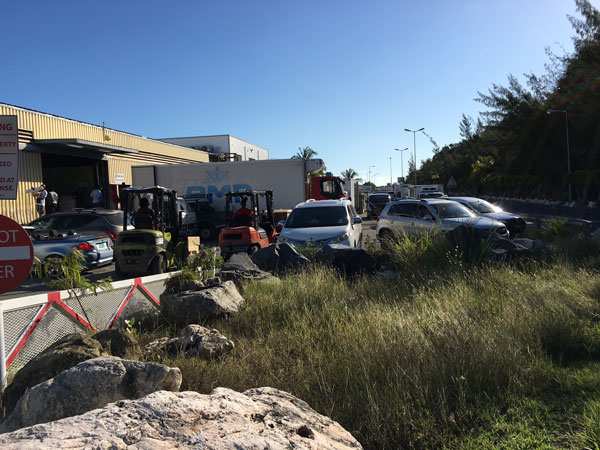 Huge investments in jeopardy due to lack of decision-making
Huge investments in jeopardy due to lack of decision-making
SIMPSON BAY:--- The management of Princess Juliana International Airport (SXM) has been ‘moving the goal post” with regards to negotiations to arrive at a mutually acceptable rental fee at the new cargo facility that is currently under construction at the airport. This is the view expressed by Safe Cargo, the largest air cargo
operator on the island in a press release issued Thursday, March 17, 2016.
According to Safe Cargo, the airport management has also been “dragging its feet” in terms of decision-making, thus putting in jeopardy potential large investments that the company has been contemplating to upgrade its services with a view to increasing its market share.
“Two years ago, SXM proposed an increase in rent per square meter as well as an air cargo tonnage fee of 4 cent. The proposal used the methodology of revenue-ton-kilometers which no other airport in the region uses,” the press release stated.
“In effect, SXM expects the tenants in the new cargo facility to pay two fees for the same space they are leasing. This is totally illogical,” the release continued.
Noting that the air cargo industry is becoming quite competitive, the release pointed to the fact that FedEx, DHL and UPS facing competition and decreasing yields in express markets and considering the limited growth in international small package now carry standard air freight as “fillers” but do not rent space at SXM airport.
This, according to Safe Cargo, means there is no level playing field at the airport in terms of air cargo fees.
Safe Cargo has been operating at the airport for more than 30 years. It is the largest operator, with over 40 employees and a vast knowledge of the cargo industry and market. It has often pointed out the unacceptable and inefficient conditions at the previous cargo facility to the Airport management to no avail.
There was an overall facility shortage and inadequate supply of staging, and storage areas, and the general hygienic and safety and security conditions were substandard. The airport, as the facility operator, was very late in meeting the air cargo infrastructure and facility demand, and in addressing current standards and upgrading the facility.
Meanwhile, Air Cargo yields continue to decline slowly, consistent with persisting weakness in load factors, keeping downward pressure on cargo business financial performance. Air cargo load factors on average are showing a weak 45 percent, therefore aircraft utilization rates will continue to be challenged by ever increasing capacity.
According to the most recent figures available, SXM Airport handled 5,314 tonnes of cargo in 2014. 83% of the air cargo in that year was inbound, while the remaining 17% were outbound. This means that imports outpaced exports by a ratio of about 5 to 1. Ten airlines provided air cargo services to SXM airport in 2014.
The proposed tonnage, through-put or concession fees will affect the various sectors and ultimately the consumers. In other words, the public can expect an increase in the prices of goods imported by air cargo, if the airport insists on these fees.
Additional tariffs, Safe Cargo warns, will curtail demand, and result in airlines focusing on increasing costs. This will make air cargo fail to fully deliver on its promise and lead to a possible exit of the company from the airport and possibly even from the country.
This, of course, is far from desirable given the important role Safe Cargo and air cargo in general play, especially in emergencies. During disasters such as Hurricane Louis, Safe Cargo
played a key role in the delivery of urgently needed assistance. Safe Cargo enabled St. Maarten, St. Martin and the surrounding islands to efficiently connect to distant markets and global supply chains in a speedy and reliable manner. The company attracted a 767 aircraft to the island, thereby enhancing the competitive position of the airport in the region.
However, the air cargo infrastructure development at SXM is not integrated with the process of attracting and retaining air cargo carriers.
The lack of dialogue with stakeholders, a lack of information concerning the completion of the Cargo Terminal Building and the applicable standards and services and the constant change in policies by the SXM airport management team all combine to place the further sustainability and growth of the Cargo Market on the island at risk. This will invariably have a negative impact on SXM Airport itself and on the economies of St. Maarten/St. Martin and those of the hub islands.












